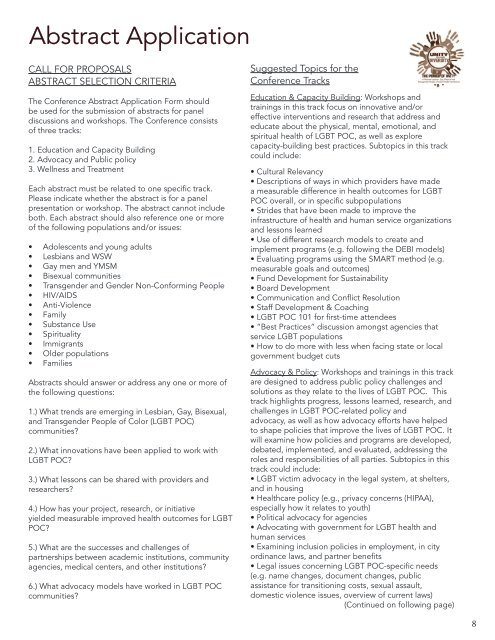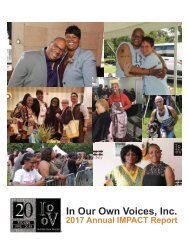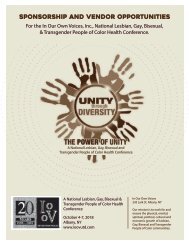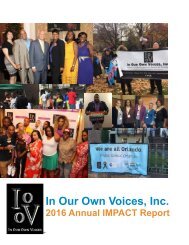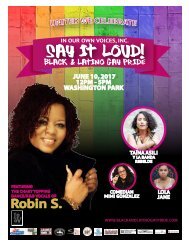2018 Registration Booklet
You also want an ePaper? Increase the reach of your titles
YUMPU automatically turns print PDFs into web optimized ePapers that Google loves.
Abstract Application<br />
CALL FOR PROPOSALS<br />
ABSTRACT SELECTION CRITERIA<br />
The Conference Abstract Application Form should<br />
be used for the submission of abstracts for panel<br />
discussions and workshops. The Conference consists<br />
of three tracks:<br />
1. Education and Capacity Building<br />
2. Advocacy and Public policy<br />
3. Wellness and Treatment<br />
Each abstract must be related to one specific track.<br />
Please indicate whether the abstract is for a panel<br />
presentation or workshop. The abstract cannot include<br />
both. Each abstract should also reference one or more<br />
of the following populations and/or issues:<br />
• Adolescents and young adults<br />
• Lesbians and WSW<br />
• Gay men and YMSM<br />
• Bisexual communities<br />
• Transgender and Gender Non-Conforming People<br />
• HIV/AIDS<br />
• Anti-Violence<br />
• Family<br />
• Substance Use<br />
• Spirituality<br />
• Immigrants<br />
• Older populations<br />
• Families<br />
Abstracts should answer or address any one or more of<br />
the following questions:<br />
1.) What trends are emerging in Lesbian, Gay, Bisexual,<br />
and Transgender People of Color (LGBT POC)<br />
communities?<br />
2.) What innovations have been applied to work with<br />
LGBT POC?<br />
3.) What lessons can be shared with providers and<br />
researchers?<br />
4.) How has your project, research, or initiative<br />
yielded measurable improved health outcomes for LGBT<br />
POC?<br />
5.) What are the successes and challenges of<br />
partnerships between academic institutions, community<br />
agencies, medical centers, and other institutions?<br />
6.) What advocacy models have worked in LGBT POC<br />
communities?<br />
Suggested Topics for the<br />
Conference Tracks<br />
A National Lesbian, Gay, Bisexual and<br />
Transgender People of Color Health Conference<br />
Education & Capacity Building: Workshops and<br />
trainings in this track focus on innovative and/or<br />
effective interventions and research that address and<br />
educate about the physical, mental, emotional, and<br />
spiritual health of LGBT POC, as well as explore<br />
capacity-building best practices. Subtopics in this track<br />
could include:<br />
• Cultural Relevancy<br />
• Descriptions of ways in which providers have made<br />
a measurable difference in health outcomes for LGBT<br />
POC overall, or in specific subpopulations<br />
• Strides that have been made to improve the<br />
infrastructure of health and human service organizations<br />
and lessons learned<br />
• Use of different research models to create and<br />
implement programs (e.g. following the DEBI models)<br />
• Evaluating programs using the SMART method (e.g.<br />
measurable goals and outcomes)<br />
• Fund Development for Sustainability<br />
• Board Development<br />
• Communication and Conflict Resolution<br />
• Staff Development & Coaching<br />
• LGBT POC 101 for first-time attendees<br />
• “Best Practices” discussion amongst agencies that<br />
service LGBT populations<br />
• How to do more with less when facing state or local<br />
government budget cuts<br />
Advocacy & Policy: Workshops and trainings in this track<br />
are designed to address public policy challenges and<br />
solutions as they relate to the lives of LGBT POC. This<br />
track highlights progress, lessons learned, research, and<br />
challenges in LGBT POC-related policy and<br />
advocacy, as well as how advocacy efforts have helped<br />
to shape policies that improve the lives of LGBT POC. It<br />
will examine how policies and programs are developed,<br />
debated, implemented, and evaluated, addressing the<br />
roles and responsibilities of all parties. Subtopics in this<br />
track could include:<br />
• LGBT victim advocacy in the legal system, at shelters,<br />
and in housing<br />
• Healthcare policy (e.g., privacy concerns (HIPAA),<br />
especially how it relates to youth)<br />
• Political advocacy for agencies<br />
• Advocating with government for LGBT health and<br />
human services<br />
• Examining inclusion policies in employment, in city<br />
ordinance laws, and partner benefits<br />
• Legal issues concerning LGBT POC-specific needs<br />
(e.g. name changes, document changes, public<br />
assistance for transitioning costs, sexual assault,<br />
domestic violence issues, overview of current laws)<br />
(Continued on following page)<br />
8


